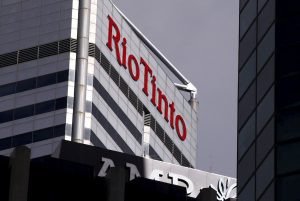Shares in Rio Tinto tumbled on Friday after Serbia revoked its lithium exploration licences over environmental concerns, dealing a blow to the Anglo-Australian miner’s ambition to become Europe’s largest supplier of the metal used in electric vehicles.
The move by Serbia comes as the country approaches a general election in April, and as relations between Belgrade and Canberra have soured after the deportation of tennis star Novak Djokovic from Australia over Covid-19 entry rules.
The decision is a major setback for Rio, which was hoping the project would help make it one of the world’s 10 biggest producers of the lithium, a key ingredient in batteries and much in demand in the electric vehicle boom.
The mine in the Jadar Valley in western Serbia was scheduled to start production in 2027.
Rio’s shares fell as much as 3.8% in the Australian stock market, its worst intra-day drop since September 2021. The benchmark index was down 1.5%.
Serbian Prime Minister Ana Brnabic said in a news conference in Belgrade that the government’s decision came after requests by various green groups to halt the $2.4 billion Jadar lithium project.
Rio said it was “extremely concerned” by Serbia’s decision and was reviewing the legal basis for it. “The level of opposition to [Jadar] has really ratcheted up over the past six months,” Credit Suisse analyst Saul Kavonic said.
Thousands of people blocked roads last year in protest against the government’s backing of the project, demanding Rio Tinto leave the country and forcing the local municipality to scrap a plan to allocate land for the facility.
Timeline Pushed Back
Earlier this week, Rio pushed back the timeline for first production from Jadar by one year to 2027, citing delays in key approvals.
At full capacity, the Jadar mine was expected to produce 58,000 tonnes of refined battery-grade lithium carbonate per year, making it Europe’s biggest lithium mine by output.
Rio Tinto said last year that it would buy the Rincon lithium project in Argentina for $825 million as it looks to build its battery materials business.
Europe and North America are talking about EV supply chains and raw material supply chains from the macro point of view, but on the ground, there’s opposition at the local level to projects, said Sam Brodovcky, Standard Chartered’s head of global metals and mining M&A.
“This highlights that there will be an even greater shortage of lithium and other critical and battery materials,” Brodovcky said.
“There aren’t that many projects like Jadar, and the Western world is not going to have its own supply chain if these are not developed,” he added.
Experts said the world’s shortage of lithium had been forecast to last for another three years at least, but with the cancellation of the Jadar project, the shortfall will now last for several years.
“We’re at the point now where lithium supply is going to set the pace of electric vehicle rollout,” Kavonic said.
- Reuters with additional editing by Jim Pollard
ALSO READ:
BHP Cuts Output Guidance As Rio Delays Key Lithium Mine
Honda Motor Signs Deal with Lithium-Metal Battery Maker
Rio Tinto CEO resigns over destruction of Aboriginal site























